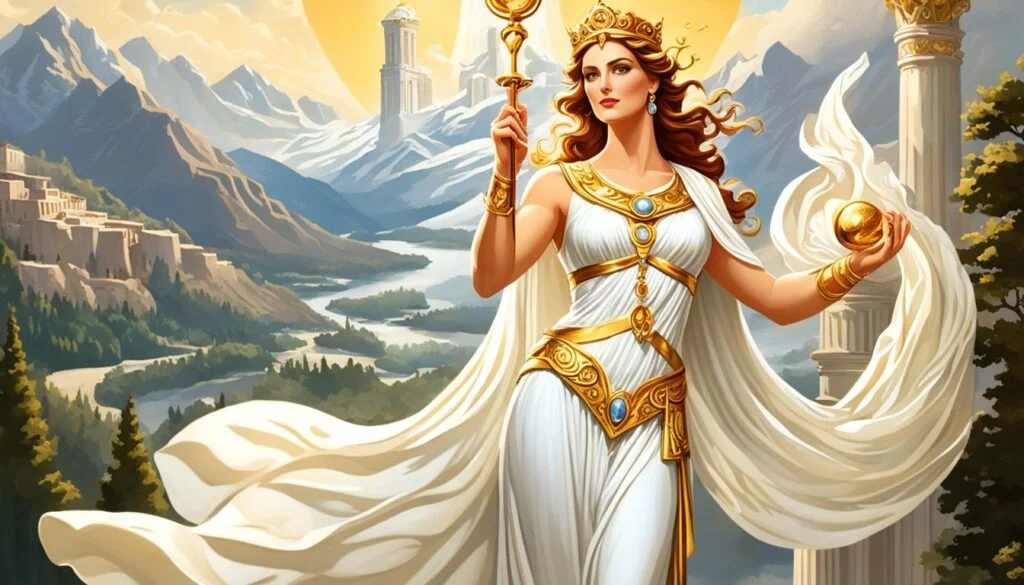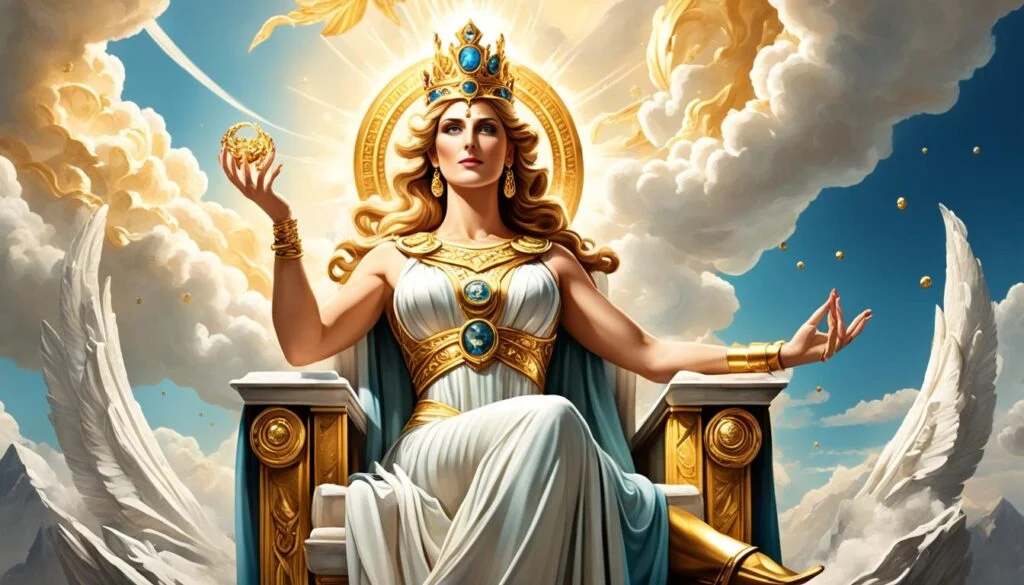In Greek myths, Hera was a mighty and complex goddess. She had great power over both mortals and gods.
As the queen of the olympian gods, hera had a central role in many famous stories.
She was in charge of things like marriage, making her an important figure. Known for protecting those areas fiercely, she was not to be crossed.
Her anger towards Zeus’s lovers and children has left a mark on Greek myths.
Hera is usually shown as a dignified, older woman. She often wore a crown to show her high status. Her favorite animals were the cow, cuckoo, and peacock.
These animals and symbols help us remember her, even in modern times, through her Roman equivalent Juno.
Key Takeaways
- Hera was the queen of the Olympian gods in Greek mythology
- She was the goddess of marriage, women, family, and childbirth
- Hera was known for her jealousy and vengeance against Zeus’s lovers
- Her sacred animals included the cow, cuckoo, and peacock
- Hera’s Roman equivalent was Juno
Who Was Hera in Greek Mythology
Hera was a leading figure among the twelve Olympians. Her role in Greek mythology greatly affects both the lives of gods and people.
She was born to Titans Cronus and Rhea.
Hera’s Origins and Parentage
Hera, oldest daughter of Cronus and Rhea, faced early struggles. Cronus, fearing his children’s power, swallowed them.
Yet, they were saved, with some tales saying Hera was cared for by ocean deities.
Her Role as Queen of the Olympian Gods
As Queen of the Gods, Hera was highly respected. She had great power, especially in matters of marriage and family.
Hera was known for protecting women and influencing key divine decisions.
Hera’s Marriage to Zeus
The marriage of Hera and Zeus was central in Greek myths. As hera zeus’ wife, she faced difficulties due to Zeus’ infidelity.
Their union symbolized the link between heaven and earth. Hera’s advice was highly regarded, showing her importance.
Hera’s Divine Domains and Responsibilities
Hera was not just any Greek god. She was the goddess who looked over marriages and childbirth.
She was married to Zeus, the king of gods, and was quite powerful. Protecting the bonds of marriage and family was very important to ancient Greeks because of her.
Hera, goddess of marriage, oversaw the vows of weddings. She cared for women in pregnancy and during deliveries.
Her main concerns were the happiness of husbands and wives, as well as the safety of mothers and their children.
- Guarding the sanctity of marriage
- Protecting women throughout their lives
- Overseeing childbirth and family life
- Conferring the power of prophecy
Hera went by different names that showed her roles. Some called her Eileithyia for childbirth, Gamelia for weddings, and Teleia for married women.
Each name showed how diverse her duties were in the Greek world.
Even with her problems with Zeus, Hera stood for faithfulness. She was a role model for being true in marriage.
Greek women looked to her for advice on making their marriages strong and lasting.
The Symbolism and Iconography of Hera
In Greek mythology, Hera is the queen of the gods. She holds many rich symbols that show her power and the stories about her.
Sacred Animals
Hera’s special animals are the cow, peacock, and cuckoo. The cow stands for life and being a mother. The peacock shows her wisdom and vision.
The cuckoo comes from a story about Zeus trying to impress Hera.
Symbolic Objects
Items that symbolize Hera’s rule include:
- Crown or diadem
- Scepter
- Pomegranate
- Lotus
- White lily
These things show her royal status and powers. The pomegranate is about living forever.
The lotus and lily mean being pure and starting a new life.
Artistic Depictions
In ancient art, Hera looks like a respected, motherly woman. She is usually beautiful, wearing a crown, and holding a scepter with a lotus flower.
Sometimes she’s on a throne, sometimes standing.
Art shows Hera with her special animals or holding her symbolic things. They show her as the top god and someone who looks after vows and having babies.
This art celebrates her as a queen and a powerful god in stories from ancient Greece.
Hera’s Family and Relationships
Hera’s family life was both strong and stormy. As Zeus’ wife, she was mighty in the gods’ lineup.
Hera was mom to Ares, Hephaestus, Hebe, and maybe Eileithyia too.
Her marriage to Zeus was not smooth. His wandering eye caused Hera much trouble. Known for jealousy, she often punished those close to Zeus.
But Hera wasn’t only Zeus’s wife. She supported women and childbirth and aided notable heroes.
She helped the Argonauts, showing she had influence beyond her family’s circle.
- Hera’s children: Ares (god of war), Hephaestus (god of fire and metalworking), Hebe (goddess of youth)
- Sacred animal: Peacock, which pulled her chariot
- Worship centers: Temples at Argos, Olympia, Mycenae, Sparta, and Samos
Hera’s myth highlights family life’s joys and challenges. She shows both the loving and tough sides of being a mother.
This makes her tale a rich part of ancient stories.
Famous Myths and Legends Featuring Hera
Greek mythology tells many hera myths and legends. They show her strength and influence.
Hera’s stories mainly focus on her marriage with Zeus and how she protects it.
The Birth of Hephaestus
One fascinating Hera story is about Hephaestus’ birth. Upset by Zeus’s affairs, Hera had Hephaestus alone.
When she saw he was not perfect, she threw him off Mount Olympus. This tale shows Hera can be both creative and fair, but also harsh.
Hera’s Role in the Trojan War
In the Trojan War, Hera backed the Greeks because of a rivalry with the Trojans. This rivalry began with the Judgment of Paris.
Hera lost a beauty contest to Aphrodite, leading her to take sides in the war. It shows her as proud and grudge-holding.
Conflicts with Zeus’s Lovers
Hera often fought Zeus’s lovers and their children. She made life hard for Leto and Apollo’s mother.
She also caused problems for Dionysus’s mother, Semele, which led to her death. Hera’s jealousy even made Heracles’ life difficult.
She’s seen as a strong and sometimes vengeful deity in these stories.
Hera’s Worship and Cult Centers in Ancient Greece

Hera, the greek goddess, was highly esteemed in ancient Greek religion. Worship of Hera spanned Greece, with key centers in places like Argos, Samos, and Olympia.
These locations were pivotal in greek myths and religious customs tied to Hera.
Argos said it was Hera’s birthplace and housed a notable sanctuary. This site, between Argos and Mycenae, had the Argive Heraion.
It showcased a huge gold and ivory statue of Hera. Samos was also important, with a sizable temple devoted to her.
Festivals highlighted Hera’s divine nature. The Heraia in Olympia, a counterpart to the Olympic Games for women, was significant.
At this festival, women raced, winning olive crowns and parts of a sacrificed ox.
In many cities across Greece, Hera was honored as a key deity. In these local cults, Hera bore special names like Akraia, Bounaia, and Basileia.
These titles highlighted her roles in protecting cities, marriages, and women.
- Argos: Birthplace claim and famous sanctuary
- Samos: Significant worship site with large temple
- Olympia: Host of the Heraia festival
- Various local cults with unique epithets
Hera’s worship greatly influenced Greek life, focusing on her roles in marriage, family, and women’s worlds.
Her temples were important for both religious and community gatherings. This solidified her position as a central figure in the ancient Greek pantheon.
The Roman Counterpart of Hera: Juno
Juno, in Roman belief, was like Greek’s Hera but more. She was seen as important for the state.
Daughter of Saturn and Ops, she was Jupiter’s sister and wife. Juno was also a mother to gods like Mars and Vulcan.
Similarities and Differences
Hera and Juno were both queen gods known for marriage and childbirth. Juno, however, held a key role in Rome’s religion too.
She stood with Jupiter and Minerva in the Capitoline Triad. This trio symbolized the wisdom and strength of ancient Rome.
Unlike Hera’s jealous image, Juno was seen as a community guardian with military ties.
She brought a different vibe to the goddess of marriage and childbirth.
Juno’s Role in Roman Mythology
Juno had many names for her many roles. As Juno Pronuba, she attended to marriages. While known as Juno Lucina, she protected mothers giving birth.
Celebrated on February 15 at Lupercalia, she was linked to purity and fertility. But Juno wasn’t just about homes and families; she was also about power and safety, making her a rich and varied Roman goddess.
By comparing Hera with Juno, we see their unique places in mythology. They both stood up to male gods but in different ways.
Both reflected the strength and grandeur of women in their mythologies.
Hera’s Influence on Greek Culture and Society

Hera was the Greek goddess overseeing marriage and childbirth. She greatly impacted Greek society. Being one of the twelve Olympians, she held significant power.
Her influence spanned religious rites to social standards.
The worship of Hera was at the heart of Greek traditions. Celebrations like the Heraia highlighted her importance.
These festivals brought people together and included sports for women. This stressed Hera’s support for women in a typically male-run world.
Hera was more than just about religious rituals. She stood for the value of marriage and family. Stories of her marriage to Zeus warned against deceit in relationships.
Her image as a caring, yet sometimes envious, figure showed the ups and downs of married life.
- Hera was responsible for the welfare of women and children
- She was depicted wearing a crown and carrying a scepter
- The peacock and pomegranate were symbols associated with her
Even today, Hera’s name and role are recognized. Her name is linked with a place for women to work together, showing how she inspires to empower women.
Also, her likeness on ancient coins highlights her dual importance in both faith and finance in the Greek world.
Modern Interpretations and Representations of Hera
In today’s world, Hera from Greek mythology remains captivating and influential.
She was the Queen of the Gods, renowned for her might and intricate character. Many modern takes on Hera show her as a strong iconic figure navigating a challenging marriage.
Today, books, artwork, and media breathe new life into Hera’s character. They show her with more understanding and empathy compared to the ancient stories.
They often emphasize her as a guardian of women and the birth process, reflecting her past worshippers’ beliefs.
Viewing Hera through a feminist lens has become popular. This approach looks at her challenges and victories with a modern eye.
It highlights her strength in dealing with Zeus’s affairs and her power as a deity. This reimagining offers fresh insights into ancient myths, connecting them with our current world.
Frequently Asked Questions
What was Hera known for?
Hera was known as the queen of the gods and the goddess of marriage and family. She was also known for her jealousy and vengefulness towards Zeus’s lovers and illegitimate children.
Did Zeus and Hera have a child?
Yes, Zeus and Hera had several children together, including Ares (the god of war), Hebe (the goddess of youth), Eileithyia (the goddess of childbirth), and Hephaestus (the god of blacksmiths and fire).
Why did Hera marry her brother Zeus?
In Greek mythology, it was common for gods to marry within their family to preserve their divine lineage. Hera married Zeus, her brother, to become the queen of the gods and to maintain her power and status within the Olympian hierarchy.
Did Zeus actually love Hera?
Zeus’s relationship with Hera was complex. While he did care for her and they had a long-lasting marriage, Zeus was notoriously unfaithful, having numerous affairs with other goddesses and mortals, which caused significant strife in their marriage.
Did Hera divorce Zeus?
No, Hera did not divorce Zeus. Despite their tumultuous relationship and Zeus’s infidelities, they remained married and continued to rule as king and queen of the gods.
Did Zeus ever cheat on Hera?
Yes, Zeus cheated on Hera numerous times with various goddesses, nymphs, and mortal women. His infidelities were a constant source of conflict in their marriage.
How many affairs did Zeus have?
Zeus had many affairs, with myths listing numerous lovers, including goddesses like Demeter and Leto, and mortals like Alcmene and Leda. The exact number of his affairs varies across different stories and sources.
How did Hera punish Zeus’s lovers?
Hera often punished Zeus’s lovers and their offspring out of jealousy and anger. She inflicted various forms of suffering and hardship on them. For example, she turned Callisto into a bear, pursued Leto across the world to prevent her from giving birth, and drove Io to madness and wandering.




